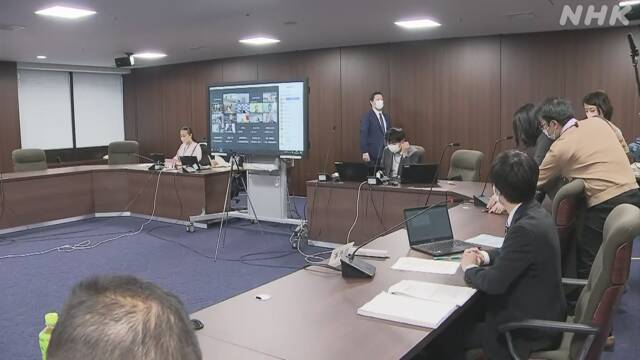An expert meeting of the Ministry of Health, Labor and Welfare was held to advise on measures against the new coronavirus, and the number of new infections continued to decline, and although the number of deaths and cases in which emergency transportation was difficult remained at a high level, it was on a downward trend. I analyzed that there is
In the future, while the new corona is expected to continue to decline nationwide, influenza is expected to continue to increase, pointing out that it is necessary to pay attention to simultaneous epidemics.
The expert meeting has analyzed that the current infection situation continues to decline nationwide and is expected to continue to decline nationwide in the future.
The hospital bed occupancy rate is on a downward trend, and although the number of cases in which it is difficult to transport ambulances is decreasing, there are areas where there are extremely many.
And while the number of deaths is on a downward trend despite the high level, the percentage of infected people in their 80s and above continues to be higher than the 7th wave last summer, so we need to continue to pay attention. pointed out.
In addition, the proportion of the Omicron strain "BQ.1", which is said to be more susceptible to evading immunity, is increasing in Japan, and the Omicron strain "XBB.1.5", which has been reported mainly in the United States and has been detected in Japan, etc. It is imperative that we continue to monitor the evolution of the mutating virus.
On the other hand, he pointed out that seasonal influenza, which has entered the epidemic season nationwide, is expected to continue to increase in the future, and that it is necessary to pay attention to the simultaneous epidemic of the new corona and influenza.
The expert meeting pointed out that it is necessary to strengthen and prioritize the medical system to provide appropriate medical care to the elderly and those at high risk of becoming seriously ill. We are requesting that we prepare an antigen test kit that can be tested in and prepare for infection.
We continue to call for thorough basic infection control measures, such as eating
and
drinking with as few people as possible and wearing masks except when eating and drinking
, thorough ventilation, and refraining from going out when you have symptoms.
Dr. Wakita, “Is the Decrease a Transient Collective Immunity?”
At a press conference held after the expert meeting, chairman Takaji Wakita commented on the current infection situation, saying, "Although there are differences depending on the region, there is a downward trend in infections in all regions. However, the infection rate among the elderly is increasing. There are many areas, so we need to pay attention to future trends."
On top of that, regarding the reason for the decrease, he said, ``In the meeting, it is said that, like the decrease in the previous 7th wave, there is a certain amount of transient collective immunity, and it may be heading in the direction of convergence. However, in the future, there is a possibility that it will be replaced by a mutated virus that has a strong ability to escape immunity, such as the "XBB" strain, which is prevalent overseas, and I think that the trend of future infections will be affected by this movement. ' said.
Regarding the position of the novel coronavirus under the Infectious Diseases Control Law, Chairman Wakita said, ``With the revision, there is a discussion about how to think about infection control, and we will continue to discuss what kind of measures should be taken in the future. Opinions were also raised about the medical system and how public funds for treatment should be shared, but in any case, it is necessary to continue providing medical care for the coronavirus and general medical care, and a gradual transition to prevent negative impacts. There was an opinion that it was necessary," he explained.
Number of new infections in a week 0.59 times compared to the previous week Decreasing trend in all prefectures
According to the materials presented at the Ministry of Health, Labor and Welfare's expert meeting, the number of new infections nationwide in the week ending on the 24th was 0.59 times compared to the previous week, and the downward trend continues in all prefectures.
Among the three prefectures in the Tokyo metropolitan area,
▽ Tokyo is 0.59 times,
▽ Kanagawa Prefecture is 0.61 times,
▽ Saitama Prefecture is 0.62 times, and
▽ Chiba Prefecture is 0.63 times, and the downward trend continues.
In Kansai,
▽Osaka 0.60,
▽Hyogo 0.62,
▽Kyoto 0.57,
Tokai
▽Aichi 0.58,
Mie 0.71,
Gifu 0.56, etc. prefectures decreased compared to the previous week.
The number of infected people per 100,000 population in the most recent week was
▽ Mie prefecture with 761.92 people, the highest in Japan,
followed by
▽ Tottori prefecture with 702.56 people,
▽ Shizuoka prefecture with 690.22 people,
▽ Hiroshima prefecture with 663.50 people,
▽ Wakayama prefecture.
The prefecture has 651.76 people, and there are no areas with more than 1,000 people.
In addition
, ▽ 321.83 people in Tokyo,
▽ 427.86 people in Osaka Prefecture,
and
▽ 445.11 people nationwide.
Mr. Kamaya, Japan Medical Association "There is no problem with changing masks at school sites"
At a press conference, Executive Director of the Japan Medical Association, Kamasaki, said, "Even if the position of the new corona under the Infectious Diseases Act is shifted to '5', we will not continue to ask you to wear a mask at medical sites, nursing care, and facilities for the elderly. However, I am aware that there are quite a few calls for changes to measures so that schools do not have to wear masks as soon as possible. I think there is no problem," he said.

